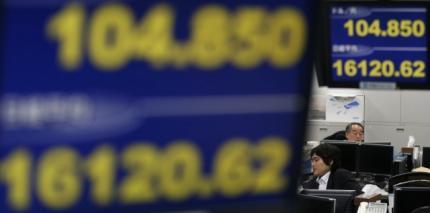Stocks Edge Lower after Yellen, but Bank Stocks Rise
Bareksa • 16 Jul 2014

Employees of a foreign exchange trading company work behind monitors (REUTERS/Toru Hanai)
U.S. 10-year Treasury note ended essentially flat, dipping 1/32 of a point in price to yield 2.554 percent.
Bareksa.com - U.S. stocks closed mostly lower on Tuesday, after the Federal Reserve, in an unusual statement, singled out the valuation of social media and biotechnology shares as "substantially stretched."
Bond prices were flat but gold fell as comments by Fed Chair Janet Yellen suggested that interest rates hikes could come sooner than anticipated if the labor market continued to improve.
Separately, oil prices tumbled amid rising supply from Libya.
On Wall Street, bank stocks provided some support and put the Dow into slightly positive territory. JPMorgan Chase & Co and Goldman Sachs outperformed after reporting strong results.
The Fed's semi-annual monetary policy report, which accompanied Yellen's testimony to the Senate Banking Committee, noted that overall U.S. stock valuations were "generally at levels not far above their historical averages," though it singled out riskier sectors of the market.
Social media and biotechnology shares slumped following the release of the report, with the Nasdaq Biotech Index down 2.3 percent.
"These are the subindustries that have caused a lot of long-time stock watchers to scratch their heads," said Kim Forrest, senior equity research analyst at Fort Pitt Capital Group in Pittsburgh. "These companies have relative few earnings, especially in the biotech area."
Overall, Yellen said the U.S. economic recovery was incomplete and she defended the central bank's accommodative monetary policies. Some signs of a pickup in inflation were not enough for the Fed to accelerate its plans for raising interest rates, she said, but improved labor markets might accelerate the process.
"If the labor market continues to improve more quickly than anticipated by the Committee, resulting in faster convergence toward our dual objectives, then increases in the federal funds rate target likely would occur sooner and be more rapid than currently envisioned," Yellen said.
Bond yields initially rose after her comments, but the U.S. 10-year Treasury note ended essentially flat, dipping 1/32 of a point in price to yield 2.554 percent.
Gold prices fell 1 percent and are down more than 3 percent this week. Copper rose 0.1 percent.
U.S. crude oil fell 0.9 percent to $100.01 per barrel. Brent crude lost 1 percent as rising supplies from Libya overshadowed renewed violence in the country.
The Dow Jones industrial average rose 5.26 points, or 0.03 percent, to 17,060.68, the S&P 500 lost 3.82 points, or 0.19 percent, to 1,973.28, and the Nasdaq Composite dropped 24.03 points, or 0.54 percent, to 4,416.39.
The MSCI World Index fell 0.3 percent while European shares ended down 0.4 percent, pressured by a drop in Germany's ZEW index of economic sentiment. The MSCI International ACWI Price Index fell 0.25 percent.
BANK EARNINGS
While Yellen's comments were the day's primary driver, financial shares helped major indexes recover from early losses.
Both JPMorgan and Goldman Sachs rose after their results. JPMorgan finished up 3.5 percent to $58.27 and was the biggest gainer on both the Dow. However, another Dow component, Johnson & Johnson, fell 2 percent to $103.28 after its results.
The U.S. dollar index rose 0.25 percent, while the euro fell to a one-month low against the dollar on higher-than-forecast inflation data from Britain.
The Bank of Japan maintained its stimulus program and stuck to a forecast that inflation will approach its 2 percent target next year, unfazed by recent data casting doubt on its scenario of an investment-led economic recovery.
Japan's Nikkei average rose 0.6 percent, while shares in Hong Kong rose 0.5 percent.
The MSCI Emerging Market index, MSCI's benchmark emerging equity index, inched up 0.3 percent to a 16-month high.
Asian stock markets showed little reaction to stronger-than-expected new loan and money supply data for China. Chinese banks gave 1.08 trillion yuan ($173.90 billion) of new loans in June, beating expectations of 915 billion.
The data, coming ahead of GDP and other numbers from China due on Wednesday, underscored the perception that the Chinese economy is stabilizing after a shaky start to the year but still needs more policy support to meet Beijing's growth target. (Source : Reuters)